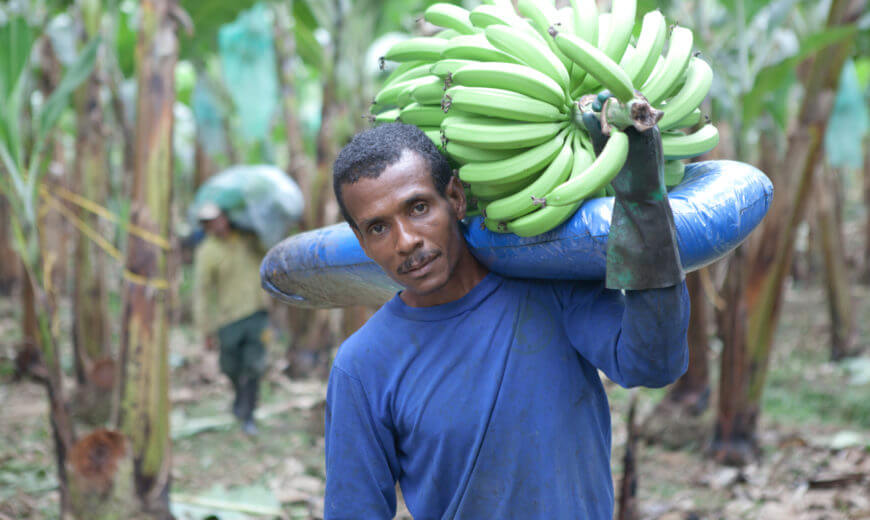At Ecuador’s annual International Convention of Banana Exporters (AEBE), Fairtrade congratulated the Ecuadorian government and banana sector on their commitment to a living wage, while also urging them to go further in establishing sound industrial relations with trade unions and securing decent work for the thousands of workers involved in banana production.
Living wage study in Ecuador has positive findings
Ecuador is by far the biggest exporter of banana worldwide. A recent living wage study for the Global Living Wage Coalition, conducted by a team led by Martha and Richard Anker and supported by Fairtrade, sets the living wage in the three major banana producing areas at USD $461 per month. The methodology takes into account the cost of living in a specific region, including the cost of housing, food, education, healthcare, transportation, and other essentials.
The Ecuadorian government has its own national policy for ‘salario digno’ (decent wage). Currently on banana plantations, when factoring in the mandatory 13th and 14th month salary entitlement, the minimum wage for an entry-level worker is US $466 – therefore equal to a living wage. In our work to set living wage benchmarks, we have found few other countries that have legislated minimum wages equal to a Living Wage. More details and figures can be found in the study here.
Informality in the sector and Fairtrade improving workers’ lives
While the results are positive there is still work to be done. Despite good employer practices around the sector, many banana workers in Ecuador do not have a formal contract. No official figures are available, but the report cites estimates that around 40 percent of workers in Ecuador’s banana sector are informal. Without formal registration it is hard for authorities to ensure their rights are fully respected.
Even for those with contracts, sustainable living conditions are still a challenge. For example, while education is free, parents often struggle to pay for many school essentials, such as uniforms, books and stationery, as well as transport to school. While health care is also free in theory, in practice it is very difficult to get doctor’s appointments and waiting times of months are quite common. Workers at Fairtrade certified plantations have used their Fairtrade Premium to give timely access to medical services, such as free dental and gynecological care.
Fairtrade calls for both living wages and decent work
“The Salario Digno policy is certainly praiseworthy, and yet, Decent Work requires more than an adequate minimum wage”, said Fairtrade International’s Senior Advisor for Workers’ Rights, Wilbert Flinterman. “For Decent Work to materialise, Living Wage ought to be combined with a wider approach to protect fundamental rights and freedoms in the workplace, including health and safety, gender equity, acceptable working hours, freedom of association, including the right to bargain, to name a few.”
Fairtrade calls for action on five key points:
- More business on Fairtrade terms so producers can receive a fair price: In order for producers to pay their employees living wages and for smallholders to receive a living income, they must receive a decent price for their bananas. Fairtrade is the only certification scheme with a set minimum price for bananas. The price is regularly reviewed and adjusted based on the costs of sustainable production, in consultation with producers themselves.
- Legislation on business and human rights with rules on purchasing practices: Fairtrade calls for mandatory HRDD legislation. Support for human rights legislation is growing, particularly in European countries, since voluntary arrangements have not proven to be effective. For Fairtrade it is essential that Living Wages and Living Incomes are recognised as a human right in any such legislation and connected to rules on price setting, to stop a race to the bottom in the banana industry.
- Collective bargaining across the sector to achieve living wages and decent work for all: Fair prices for bananas are best translated into a sector agreement on wages and decent work (in line with ILO’s decent work agenda), which applies to all workers in the banana sector. This can only be achieved through a system of collective bargaining, which depends on freedom of association and respect for trade union rights. Fairtrade believes that a healthy banana sector also has healthy industrial relations. We invite the sector to partner with us, trade unions and civil society to strengthen social dialogue in companies and at sector level.
- Adopting a global roadmap for Living Wage in the banana industry: Since Ecuadorian producers operate in a global market place, it is important to work on this topic in the World Banana Forum (a platform of key stakeholders from the global banana supply chain), and agree on a Living Wage roadmap with other actors in the global banana industry, but without stifling action at local level.
- Long-term buyer and retailer commitment to improve labour conditions: To achieve better livelihoods for workers in the banana industry at large, buyers and retailers should not shift business away from producers that need their support to improve labour conditions. Exercising Human Rights Due Diligence means accepting a joint responsibility with suppliers to enable better practices. In the case of Ecuador, that also means working with industry and government on strengthening social dialogue and collective bargaining in the banana sector. Fairtrade wants to be a partner in those efforts.
Fair prices and fair terms of trade are essential to ensure that every worker and family can earn a decent living through their work. To improve working conditions of all banana workers, it is critical that workers organise in free and independent organisations and negotiate their own terms of work. At the same time, vulnerable producers need a long-term commitment from buyers to invest in better workplace conditions. By choosing Fairtrade bananas, everyone can help drive positive change in the global banana industry.
Article reproduced from: https://www.fairtrade.net/news/fairtrade-highlights-importance-of-decent-work-at-international-banana-convention
Photo: Robinson Ramirez Segura working at a Hired Labour Organization in Ecuador. © Fairtrade International/ Stefan Lechner
